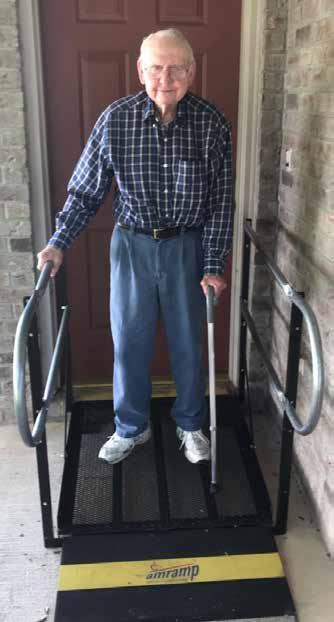
6 minute read
Seniors and Retirees Are Returning To College – Here's How You Can Too
BY KIMBERLY BLAKER
Resources For
Financial Assistance
1. Fast Web – Visit Fast Web for information on colleges and a scholarship search at www.fastweb.com 2. Student Guide – For federal grants and loans request your Student Guide by calling (800) 433-3243 or visit www.studentaid.ed.gov/resources 3. U.S. Department of Education – Visit the U.S.
Department of Education for information on tax credits at www.studentaid.ed.gov/types/tax-benefits L ike many seniors and retirees today will attest, you're never too old to go to college. Lifelong learning has become increasingly popular in recent years as baby boomers have reached the age of retirement. For some, the purpose of going back to school is to finish their studies and accomplish a degree. But for many more, it's merely for fun and an opportunity to gain knowledge, discover new interests and keep their minds and bodies fit.
With the rising costs of college, you may see it as an unlikely endeavor. Not to mention, if you're still in the workforce, where would you find time for the commute and classes, let alone time to study? Fortunately, there are many ways to overcome these obstacles.
If you'd like to go to college, first consider your purpose and what you hope to accomplish. Do you want to earn your degree? Are you primarily interested in broadening your knowledge? Are you in search of new interests and socializing opportunities? Your answer might be one or all of these. But knowing your purpose will give you direction.
Once you've determined what you hope to achieve, visit nearby colleges or explore the websites of colleges in the city or state where you'd like to settle for retirement, and see what they have to offer.
NON-TRADITIONAL COLLEGE CREDIT
If earning your degree is important to you, more and more accredited colleges offer a variety of options for earning nontraditional course credit. Look into this first to save time and money.
At some colleges, you can earn Self-Acquired Competency (SAC) credits, which may have different names at various institutions. Such credits are available for a wide range of skills and life experiences. They require compiling a portfolio for faculty evaluation. In your portfolio, you can include on-the-job training, work and volunteer experience, workshops, seminars and more. If you served in the military, you might be eligible for military service credit for education you gained through schools, experience or service.
You can also earn credits by examination. Some of these include: • Credits for College-Level Examination Programs (CLEP) • Advanced Placement Examinations (AP) • Defense Activity for Non-Traditional Education Support (DANTES)
Credit by examination can also save time and money if you have knowledge in a particular area or if you study and test well. But be sure to check with your institution before enrolling since credit may not be awarded following admission.
Another possibility for credits is if you’ve completed any noncollegiate or in-company sponsored programs or courses. Find out if those programs or courses are any of the thousands reviewed by the American Council on Education (ACE). If so, ask your academic institution if they award credits based on ACE recommendations.
CORRESPONDENCE AND ONLINE COURSES
Independent study programs offer a couple of options. You can take online courses in the convenience of your home. These usually require attendance (at your computer) at specific times. Correspondence courses are a good option also because there are no schedules. They typically allow six to 18 months for completion with extensions up to one year. Evening and weekend courses, as well as accelerated programs, also offer some flexibility.
HOW TO PAY FOR TUITION AND BOOKS
There are many options for financing your education. The Federal Pell Grant is available regardless of your age and is awarded based on financial need. The maximum award amount for the 2020-21 school year is $6,345.
Several other options include: • The Federal Supplemental Education Opportunity Grant (FSEOG) • The Federal Work-Study Program • The Federal Perkins Loan • Federal Subsidized Stafford Loan • Federal Unsubsidized Stafford Loan
Many scholarships are also available for seniors. So ask the academic institutions you're considering what they offer.
If you're still in the workforce, ask your employer if it offers reimbursement for college courses. If the classes relate to your job, your employer may cover the costs.
Finally, don't forget the American Opportunity Tax Credit, which modifies the HOPE Credit, a tax credit available for eligible taxpayers, totaling up to a maximum of $2,500. There's also the Lifetime Learning tax credit. Specific requirements and restrictions apply.
If you aren't interested in pursuing a degree but want the opportunity to attend courses, many colleges also offer special rates to seniors to audit a class.
COORDINATING MULTIPLE RESPONSIBILITIES
Like many older Americans, you may still be working. But with a little planning and finesse, you can develop workable solutions that'll free-up time for your studies.
Start by making a list of all your responsibilities, then cross off anything unnecessary. Where else can you save time? You can do housecleaning every 10 to 14 days rather than weekly. Skip cleaning anything that isn't in dire need until the next time. Straighten up only the main rooms daily. Others can wait.
Make a pact to limit volunteering your time until you’ve reached your educational goals. If ‘no’ isn’t in your vocabulary, create reminder cards. Then put them by the phone and in your purse, so you’ll be prepared to say ‘no’ at all times.
Discuss the importance of furthering your education with your partner. Ask which responsibilities your partner is willing to take over until you’ve accomplished your goals.
Ask your employer if you can take shorter lunch breaks and leave earlier. Another possibility is for your employer to allow you fewer but longer workdays for an extra day of study each week.
LIFE’S VIRTUAL PROGRAMMING August 2020
LIFE Senior Services is posting a variety of videos on Facebook to help keep those staying safer at home informed and entertained. Here are a few programs planned for August. Check LIFE's Facebook page frequently for additional opportunities to connect.
Q & A With SeniorLine Friday, August 7, 14, 21 & 28 • 2 p.m.
Join LIFE’s SeniorLine aging services specialists for a look at the 2020-21 Vintage Guide to Housing & Services and some of the resources available in our area to help seniors live independently. You can ask questions during these live presentations and make suggestions for future topics.
LIFE Crafts Wednesday, August 12 & 26 • 1 p.m.
LIFE’s Director of Administration Roxanne King leads viewers through fun crafts using supplies that won’t take a big bite out of your pocketbook.
Fun Cooking With LIFE Monday, August 17 • 2 p.m.
Amberly Villegas, LIFE PACE Activities Specialist, shows us how to make a tasty no-bake dessert featuring strawberries.
Join the LIFE PACE medical team for health and wellness tips. Dr. Robert Gray, PACE medical director, and Rhonda Hilger, nurse practitioner, will present an informative program.

RSVP Knitin’ Kittens volunteers pick out colors and yarn for upcoming projects just before the shutdown.



Women work out safely at midtown Tulsa's OsteoStrong studio, a low-impact exercise facility.

Bill Rowland, local entertainer, is able to work from home.

Mr. Fiske poses with the new residential ramp his son purchased to help keep his father safe from falls. Residents at The Parke Assisted Living facility enjoy a walk outside during quarantine.

A resident at The Parke Assisted Living facility gets creative with her face mask.










